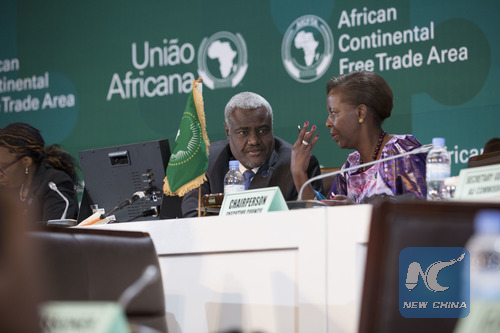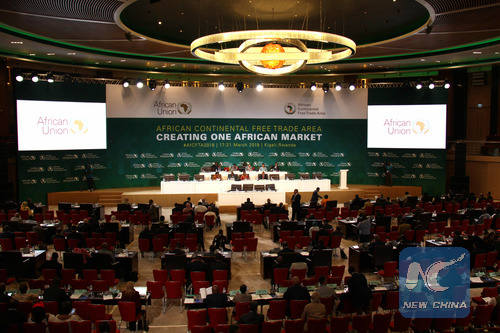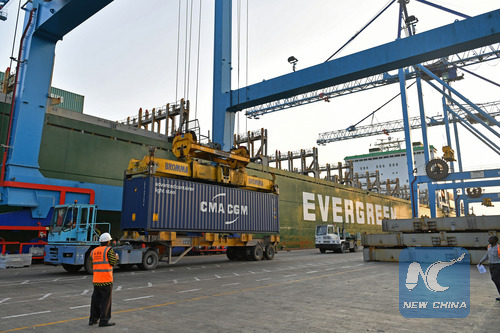
African Union (AU) Commission Chairperson Moussa Faki Mahamat (L) and Chairperson of the AU Executive Council and Rwandan foreign minister Louise Mushikiwabo talk at an AU executive council meeting in Kigali, capital city of Rwanda on March 19, 2018. Moussa Faki Mahamat on Monday stressed the importance of the African Continental Free Trade Area (AfCFTA) in Kigali. (Xinhua/Gabriel Dusabe)
KIGALI, March 21 (Xinhua) -- An agreement to launch the African Continental Free Trade Area (AfCFTA) was signed here Wednesday, thus creating the largest free trade area on the world's poorest inhabited continent.
The AfCFTA, designed to unite all 55 member countries of the African Union (AU) in tariff-free trade across the continent, is aimed at creating a single continental market for goods and services with free movement of businesses and investments, thus paving the way for accelerating the establishment of the Continental Customs Union and the African customs union.
Under the free trade agreement, Africa will enjoy more trade liberalization and also unlock its great potential for foreign investment against the backdrop of a rising global tide of protectionism.
TO BOOST INTRA-AFRICAN TRADE
The establishment of the AfCFTA, adopted in January 2012 by the AU, could create an African market of over 1.2 billion people with a gross domestic product (GDP) of 2.5 trillion U.S. dollars, according to the AU.
It will progressively eliminate tariffs on intra-African trade, making it easier for African businesses to trade within the continent and benefit from the growing African market, said the AU.
The United Nations Economic Commission for Africa (UNECA) estimated that the AfCFTA has the potential both to boost intra-African trade by 53.2 percent by eliminating import duties, and to double this trade if non-tariff barriers are also reduced.
The AfCFTA is more than a free trade agreement. It is also a platform that would facilitate the process of inclusive structural transformation and industrialization of African countries.
Africa's industrial exports are expected to benefit the most from the AfCFTA, which is important for diversifying Africa's trade and encouraging a move away from extractive commodities which have traditionally accounted for most of Africa's exports, said the pan-regional bloc.
Using the AfCFTA to pivot away from extractive exports will help to secure more sustainable and inclusive trade that is less dependent on the fluctuations of commodity prices, it said.
The AfCFTA will also produce more jobs for Africa's bulging population of young people through promoting more labor-intensive trade, according to the bloc.

Participants attend a meeting of the Permanent Representatives Committee (PRC) of the African Union (AU) in Kigali, Rwanda, on March 17, 2018. African leaders are expected to sign an agreement that will launch the African Continental Free Trade Area (AfCFTA) at an extraordinary summit of the African Union (AU) kicked off here on Saturday. The summit started Saturday with a meeting of the Permanent Representatives Committee (PRC) of the AU, a preparatory meeting of the heads of state and government summit. (Xinhua/Lyu Tianran)
A HUGE MARKET TO BE BORN
The AfCFTA is also important to other economies outside Africa. A single market of 1.2 billion people, around 3 trillion dollars in continental GDP and a growing middle class will make Africa a preferred investment destination.
It will lay a strong foundation for foreign companies to invest in Africa since there will be a huge market for foreign direct investments, Vera Songwe, under-secretary-general of the United Nations, told Xinhua on the sidelines of the ongoing AU extraordinary summit on the AfCFTA.
If Africa is integrated, it will make it easy for global economies to invest massively in Africa with fewer hindrances, said Strive Masiyiwa, founder and executive chairman of Econet, a global telecommunications group with operations and investments in over 20 countries.
The G20, some African conglomerates and global consulting groups are drawing the attention of international investors to make use of the opportunity of doing business in Africa.
It will be a huge benefit for people who are doing business with Africa and the private sector will have a bigger market, said Jan Furuvald, chairman of the Swedish-East African Chamber of Commerce.
Foreign products, especially those from Europe and Asia, can flourish in Africa at a lower cost, Charles Kayitana, senior lecturer in Economics and Development Management at the University of Rwanda, told Xinhua.
According to CEO of Rwanda Development Board Clare Akamanzi, the culmination of the AfCFTA will continue to promote sustainable industrialization both in and outside Africa through trade investments.
The AfCFTA will create an even bigger market for foreign investors, including those from China, said Li Jianbo, general director of China Road and Bridge Corporation Rwanda Office and head of Association of Chinese Enterprises in Rwanda.
Chinese entrepreneurs, while pursuing business interests on the continent, will offer more job opportunities in Africa, help improve people's livelihood there, promote local economic development and enable the African economy to catch up with global growth, Li said.

A container is unloaded from a ship in Mombasa Port, Mombasa, Kenya, in this file photo taken on Jan. 10, 2017. An agreement to launch the African Continental Free Trade Area (AfCFTA) was signed on Wednesday, thus creating the largest free trade area on the world's poorest inhabited continent. (Xinhua/Sun Ruibo)
AFRICAN INTEGRATION PROMOTES GLOBALIZATION
Amid a rising tide of protectionism and anti-globalism around the world, particularly in the West, Africa through its integration efforts is countering protectionism, said Furuvald.
While the rest of the world is revisiting the issues of trade and globalization, Africa still believes in it, said Songwe.
She cited Washington's latest decision to increase tariffs on all of its steel and aluminum imports, the long-stalled Doha Round WTO trade talks and Britain's departure from the European Union as examples.
Against such a background, Africa is "really setting a good example" to the world as a continent that has some of the world's fastest-growing economies, which is helped by advances in trade, policies, regulatory environment and regional integration, said Masiyiwa.
African regional integration has been on the agenda ever since African countries gained independence, said Ismael Buchanan, dean of the School of Economics and Governance at the University of Rwanda.
"An integrated Africa" is part of the AU's vision. To accelerate the process of integration is among the purposes of establishing the AU in 2002.
In addition to the AfCFTA, the AU has launched the Single African Air Transport Market and the African Passport to foster integration.

